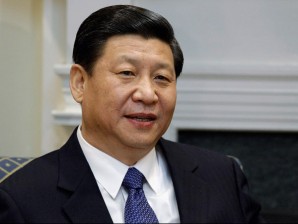Changing of the guard
BEIJING—The heirs of Mao Zedong convene this week to anoint China’s next leaders, as the Communist Party maintains an iron grip on the economic powerhouse despite mounting calls for change in the Internet era.
Vice President Xi Jinping is set to take over a country that in just a few decades has gone from a famine-wracked basket case to the world’s second-largest economy, and now has growing diplomatic heft and military reach as well.
Xi, 59, will succeed President Hu Jintao as the general secretary of the 82-million-strong Chinese Communist Party at its 18th National Congress, which starts on Thursday in the Great Hall of the People on Beijing’s vast Tiananmen Square.
The heir apparent has been No. 2 to Hu since 2008, and his appointment to head the all-powerful party will make his promotion to president of the world’s most populous nation, expected in March, a formality.
Xi, like many emerging leaders a “princeling” son of one of Mao’s lieutenants, inherits a cash-rich China newly willing to confront the United States over issues from Syria and Iran to North Korea.
Article continues after this advertisementWith increasing maritime power, China is asserting claims to seas and islands disputed by the Philippines, Japan, Vietnam and other states in the face of its growing rivalry with the United States in the Pacific Ocean.
Article continues after this advertisementExperts do not expect any sudden policy change by the new leadership and anticipate China will stick to its priorities, including avoiding a worsening of the financial crisis in Europe, its biggest export market.
Greater uncertainties
There are greater uncertainties on the domestic front, where Hu’s “golden decade” is ending with growth slowing to 7.5 percent, the lowest since the global financial crisis of 1998.
“Xi Jinping’s job is far more difficult than Hu’s job,” said Ben Simpfendorfer, managing director of Hong Kong consultancy Silk Road Associates. “It would have been much easier to introduce reforms over the last decade, not the next decade.”
Xi will be only the sixth leader since Chairman Mao founded the People’s Republic of China in 1949.
But ever since the “Great Helmsman” plunged China into chaos, the Communist Party has preferred rule by consensus and Xi will be only first among equals, balancing the priorities of different factions for the next decade.
In China’s one-party state, the five-yearly party congress is far more important than the national parliament, which convenes once a year in March.
The roughly weeklong National Congress will see more than 2,000 delegates appoint a new Central Committee of about 200 people. In turn, the members of the Central Committee will choose the 25-strong Politburo from their ranks and the elite Politburo Standing Committee.
The congress will climax with the standing committee members, including Li Keqiang, due to succeed Wen Jiabao as premier in charge of day-to-day administration in March, trooping out together.
Their number—the standing committee has nine men now, but analysts expect a reduction—and the order in which they line up will indicate whether conservatives or reformers have the upper hand.
‘Annus horribilis’
The Communist Party has had an annus horribilis heading into the congress, wracked by the Bo Xilai scandal and a drip-feed of reports about rampant corruption in high places.
Bo, who embraced Maoist revivalism and was a Politburo member until April but has now been expelled from the party, is being held in secret pending trial for corruption and abuse of power, including over his wife’s murder of a British businessman.
His rise had stoked anguish among reformers and despite his fall, his supporters remain many and influential, amid disquiet about economic policies that have opened up one of the world’s largest chasms between rich and poor.
The China of today would be unrecognizable to Mao, who died in 1976 after decades in power that included the disastrous Great Leap Forward, which led to mass famine, and the murderous mayhem of the Cultural Revolution.
The phenomenal boom of recent years was engineered by Deng Xiaoping, who took power in 1979, ditching Mao’s ultra-egalitarianism and unshackling China’s long-suppressed entrepreneurial spirit—under the party’s strict direction.
The transformation has created a middle class equipped with cars, computers and smartphones—and one increasingly used to debating events online, with the congress the first of the social media era.
Corruption, dissent
Despite the heavy hand of state censorship, Internet outrage regularly focuses on perceived corruption, and the party has vowed to clamp down on graft among China’s ruling circles, without stemming the flow of revelations.
China’s “red aristocracy”—the offspring and relatives of communist leaders—have amassed fortunes on the back of their links with powerful state-owned companies and opaque public procurement systems.
At the other end of Chinese society, 260 million migrant workers have no right of residence in the cities where they work, and hundreds of millions more still live in rural areas where they are often exploited by local party bosses.
Against that backdrop, dissidents continue to be jailed—including 2010 Nobel Peace laureate Liu Xiaobo—while the regime espouses “harmony” and “stability” as its watchwords.
Unrest mounting
China sees an estimated 180,000 protests a year on issues ranging from land grabs to pollution to workers’ rights, and many experts believe popular unrest will only mount in future.
“As people get richer, as they get readier to stand up for their rights, as they are prepared to defy Communist Party officials who sell their land illegally to industrial establishments which then pollute their landscape, then the possibility of a democratic opening I think exists,” said Roderick MacFarquhar, a Harvard-based China scholar from Britain.
But MacFarquhar believes that any political reform will be slow and gradual—and this week the Communist Party will put on a grandiose show of unity to remind China, and the world, that it remains unquestionably in charge.
